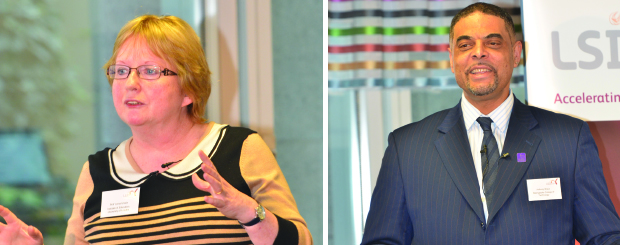“Have you been sent here as a reward . . . or as a punishment?” Lorna Unwin asked more than 100 delegates at a LSIS leadership and management conference in London late last month.
Throughout the day, delegates heard how leadership could support excellent learning, and how to lead outstanding learning.
Professor Unwin, of the Institute of Education, examined leadership and learning from a slightly different perspective.
She pointed out that most delegates had actually come to the conference as an experience that was simultaneously working and learning.
“All workplaces are sites of learning – it doesn’t matter how big they are, how small they are, what they produce, what services they provide,” she said.
“Most people still tend to think learning only takes place in classrooms or in settings designed for learning.”
Professor Unwin urged delegates to think about what their workplace was like as a learning environment.
“Maybe you have never thought of it as a learning environment, except for students, trainees and clients,” she said.
“Our institutions are workplaces. But because their focus is on the learning of those they wish to serve, they tend not to be thought of as workplaces, and I think they’re the poorer for it.
“If colleges and providers thought of themselves as workplaces they could model what good workplaces would look like, and use those new ideas with the workplaces they send learners and apprentices to.”
Professor Unwin queried why some workplaces made better learning environments than others.
In the most expansive workplaces, the process of management is regarded as a form of pedagogy
“In the most expansive workplaces I have researched, the process of management is regarded as a form of pedagogy,” she said.
In one workplace, she had been told: “To create a learning environment we need our managers to understand how learning takes place, how to foster it and nurture it and almost for managers to see themselves as teachers or tutors.”
She added: “Key to that idea is that managers spend most of their time giving feedback, listening to employees in a way that would be similar to what you’re doing with your learners.”
Anthony Bravo, principal of Basingstoke College, said the key was to have high expectations of student, staff — and yourself.
“You have to know that your college is great — or, if it’s not great, that you want to make it great. If you don’t have that belief, the college is sunk,” he said.
“Our vision is simple: every learner will succeed.”
This might be ambitious, he admitted, but having visited colleges awarded grade one by Ofsted, this ethos had stayed with him.
“Every teacher must fight for every learner. I have ridiculously high expectations, I can’t help it.
“I dream of having 100 per cent success rates, and that’s what I largely get,” he said.
“If you have low expectations the vast majority will live down to those expectations. When you have really high expectations, the vast majority will live up to them.”
Like Professor Unwin, he argued that the best support a leader could provide might be to allow people to use their own judgment.
From left: Professor Lorna Unwin, Institute of Education and Anthony Bravo, principal of Basingstoke College
“You must trust people,” he said. “You must allow them to fail. Not twice on the same thing, but definitely once.
“What’s important is that your people know what support is available for them to meet those expectations.”
He gave delegates a taster of some of the strategies for improvement he and his curriculum manager had designed, and provided copies of a teaching and learning assessment strategy for them to take away.
“There is no best way of doing anything. Whatever you do has got to be a conscious decision on your part to try and be as good as you can be,” he said.
Caption for featured image:
Professor Unwin adresses delegates at the LSIS leadership and management conference in London Pictures by Nick Linford



Your thoughts